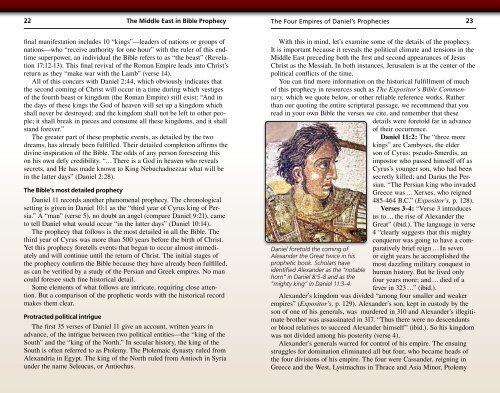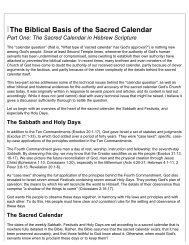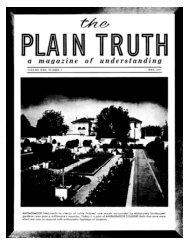The Middle East in Bible Prophecy - United Church of God
The Middle East in Bible Prophecy - United Church of God
The Middle East in Bible Prophecy - United Church of God
Create successful ePaper yourself
Turn your PDF publications into a flip-book with our unique Google optimized e-Paper software.
22 <strong>The</strong> <strong>Middle</strong> <strong>East</strong> <strong>in</strong> <strong>Bible</strong> <strong>Prophecy</strong> <strong>The</strong> Four Empires <strong>of</strong> Daniel’s Prophecies<br />
23<br />
f<strong>in</strong>al manifestation <strong>in</strong>cludes 10 “k<strong>in</strong>gs”—leaders <strong>of</strong> nations or groups <strong>of</strong><br />
nations—who “receive authority for one hour” with the ruler <strong>of</strong> this endtime<br />
superpower, an <strong>in</strong>dividual the <strong>Bible</strong> refers to as “the beast” (Revelation<br />
17:12-13). This f<strong>in</strong>al revival <strong>of</strong> the Roman Empire leads <strong>in</strong>to Christ’s<br />
return as they “make war with the Lamb” (verse 14).<br />
All <strong>of</strong> this concurs with Daniel 2:44, which obviously <strong>in</strong>dicates that<br />
the second com<strong>in</strong>g <strong>of</strong> Christ will occur <strong>in</strong> a time dur<strong>in</strong>g which vestiges<br />
<strong>of</strong> the fourth beast or k<strong>in</strong>gdom (the Roman Empire) still exist: “And <strong>in</strong><br />
the days <strong>of</strong> these k<strong>in</strong>gs the <strong>God</strong> <strong>of</strong> heaven will set up a k<strong>in</strong>gdom which<br />
shall never be destroyed; and the k<strong>in</strong>gdom shall not be left to other people;<br />
it shall break <strong>in</strong> pieces and consume all these k<strong>in</strong>gdoms, and it shall<br />
stand forever.”<br />
<strong>The</strong> greater part <strong>of</strong> these prophetic events, as detailed by the two<br />
dreams, has already been fulfilled. <strong>The</strong>ir detailed completion affirms the<br />
div<strong>in</strong>e <strong>in</strong>spiration <strong>of</strong> the <strong>Bible</strong>. <strong>The</strong> odds <strong>of</strong> any person foresee<strong>in</strong>g this<br />
on his own defy credibility. “… <strong>The</strong>re is a <strong>God</strong> <strong>in</strong> heaven who reveals<br />
secrets, and He has made known to K<strong>in</strong>g Nebuchadnezzar what will be<br />
<strong>in</strong> the latter days” (Daniel 2:28).<br />
<strong>The</strong> <strong>Bible</strong>’s most detailed prophecy<br />
Daniel 11 records another phenomenal prophecy. <strong>The</strong> chronological<br />
sett<strong>in</strong>g is given <strong>in</strong> Daniel 10:1 as the “third year <strong>of</strong> Cyrus k<strong>in</strong>g <strong>of</strong> Persia.”<br />
A “man” (verse 5), no doubt an angel (compare Daniel 9:21), came<br />
to tell Daniel what would occur “<strong>in</strong> the latter days” (Daniel 10:14).<br />
<strong>The</strong> prophecy that follows is the most detailed <strong>in</strong> all the <strong>Bible</strong>. <strong>The</strong><br />
third year <strong>of</strong> Cyrus was more than 500 years before the birth <strong>of</strong> Christ.<br />
Yet this prophecy foretells events that began to occur almost immediately<br />
and will cont<strong>in</strong>ue until the return <strong>of</strong> Christ. <strong>The</strong> <strong>in</strong>itial stages <strong>of</strong><br />
the prophecy confirm the <strong>Bible</strong> because they have already been fulfilled,<br />
as can be verified by a study <strong>of</strong> the Persian and Greek empires. No man<br />
could foresee such f<strong>in</strong>e historical detail.<br />
Some elements <strong>of</strong> what follows are <strong>in</strong>tricate, requir<strong>in</strong>g close attention.<br />
But a comparison <strong>of</strong> the prophetic words with the historical record<br />
makes them clear.<br />
Protracted political <strong>in</strong>trigue<br />
<strong>The</strong> first 35 verses <strong>of</strong> Daniel 11 give an account, written years <strong>in</strong><br />
advance, <strong>of</strong> the <strong>in</strong>trigue between two political entities—the “k<strong>in</strong>g <strong>of</strong> the<br />
South” and the “k<strong>in</strong>g <strong>of</strong> the North.” In secular history, the k<strong>in</strong>g <strong>of</strong> the<br />
South is <strong>of</strong>ten referred to as Ptolemy. <strong>The</strong> Ptolemaic dynasty ruled from<br />
Alexandria <strong>in</strong> Egypt. <strong>The</strong> k<strong>in</strong>g <strong>of</strong> the North ruled from Antioch <strong>in</strong> Syria<br />
under the name Seleucus, or Antiochus.<br />
With this <strong>in</strong> m<strong>in</strong>d, let’s exam<strong>in</strong>e some <strong>of</strong> the details <strong>of</strong> the prophecy.<br />
It is important because it reveals the political climate and tensions <strong>in</strong> the<br />
<strong>Middle</strong> <strong>East</strong> preced<strong>in</strong>g both the first and second appearances <strong>of</strong> Jesus<br />
Christ as the Messiah. In both <strong>in</strong>stances, Jerusalem is at the center <strong>of</strong> the<br />
political conflicts <strong>of</strong> the time.<br />
You can f<strong>in</strong>d more <strong>in</strong>formation on the historical fulfillment <strong>of</strong> much<br />
<strong>of</strong> this prophecy <strong>in</strong> resources such as <strong>The</strong> Expositor’s <strong>Bible</strong> Commentary,<br />
which we quote below, or other reliable reference works. Rather<br />
than our quot<strong>in</strong>g the entire scriptural passage, we recommend that you<br />
read <strong>in</strong> your own <strong>Bible</strong> the verses we cite, and remember that these<br />
details were foretold far <strong>in</strong> advance<br />
<strong>of</strong> their occurrence.<br />
Daniel 11:2: <strong>The</strong> “three more<br />
k<strong>in</strong>gs” are Cambyses, the elder<br />
son <strong>of</strong> Cyrus; pseudo-Smerdis, an<br />
impostor who passed himself <strong>of</strong>f as<br />
Cyrus’s younger son, who had been<br />
secretly killed; and Darius the Persian.<br />
“<strong>The</strong> Persian k<strong>in</strong>g who <strong>in</strong>vaded<br />
Greece was … Xerxes, who reigned<br />
485-464 B.C.” (Expositor’s, p. 128).<br />
Verses 3-4: “Verse 3 <strong>in</strong>troduces<br />
us to … the rise <strong>of</strong> Alexander the<br />
Great” (ibid.). <strong>The</strong> language <strong>in</strong> verse<br />
4 “clearly suggests that this mighty<br />
conqueror was go<strong>in</strong>g to have a comparatively<br />
brief reign … In seven<br />
Daniel foretold the com<strong>in</strong>g <strong>of</strong><br />
Alexander the Great twice <strong>in</strong> his or eight years he accomplished the<br />
prophetic book. Scholars have most dazzl<strong>in</strong>g military conquest <strong>in</strong><br />
identified Alexander as the “notable human history. But he lived only<br />
horn” <strong>in</strong> Daniel 8:5-8 and as the<br />
four years more; and … died <strong>of</strong> a<br />
“mighty k<strong>in</strong>g” <strong>in</strong> Daniel 11:3-4.<br />
fever <strong>in</strong> 323 …” (ibid.).<br />
Alexander’s k<strong>in</strong>gdom was divided “among four smaller and weaker<br />
empires” (Expositor’s, p. 129). Alexander’s son, kept <strong>in</strong> custody by the<br />
son <strong>of</strong> one <strong>of</strong> his generals, was murdered <strong>in</strong> 310 and Alexander’s illegitimate<br />
brother was assass<strong>in</strong>ated <strong>in</strong> 317. “Thus there were no descendants<br />
or blood relatives to succeed Alexander himself” (ibid.). So his k<strong>in</strong>gdom<br />
was not divided among his posterity (verse 4).<br />
Alexander’s generals warred for control <strong>of</strong> his empire. <strong>The</strong> ensu<strong>in</strong>g<br />
struggles for dom<strong>in</strong>ation elim<strong>in</strong>ated all but four, who became heads <strong>of</strong><br />
the four divisions <strong>of</strong> his empire. <strong>The</strong> four were Cassander, reign<strong>in</strong>g <strong>in</strong><br />
Greece and the West, Lysimachus <strong>in</strong> Thrace and Asia M<strong>in</strong>or, Ptolemy

















